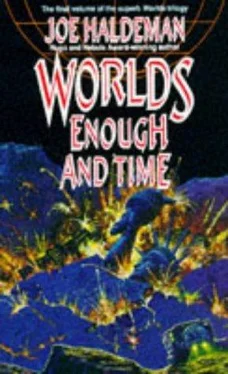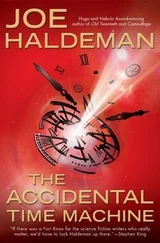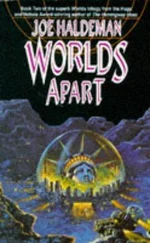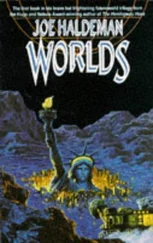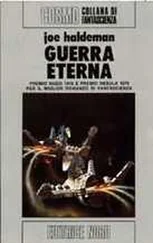With a little guilt and a lot of relief, they did.
THE NOVEL OF SANDRA’S SEX LIFE
Uncle John’s stroke was one of two hard blows that marred Sandra’s eleventh year, the first being a painful and premature loss of virginity.
O’Hara had reluctantly given Sandra permission for an early “forced” menarche, so she wouldn’t be left behind by the other girls. Predictably, a combination of natural curiosity and peer pressure had resulted in a classwide orgy of sexual experimentation, and Sandra wanted to join the party.
It was a couple of years too early. She was small, she couldn’t relax the appropriate muscles, and her hymen was tough. The first two boys she asked were unable to penetrate her before ejaculating. The third, unusually large and strong for a twelve-year-old, succeeded, but in his enthusiasm caused a lot of pain and bleeding. Sandra withdrew from the sexual marathon the same day she entered it, hurt and bewildered, distrustful of males.
Her mother took her to a gynecologist, who tried to comfort her with case histories, and used a little camera to show her that she wasn’t badly hurt inside. Both women urged that it would be a good idea for her to wait awhile, to heal emotionally more than physically. It might also give the boys in her peer group time to learn something about girls, so they wouldn’t be such blunt instruments. They were both supportive and nonjudgmental and made her feel like shit.
She took her pain to Uncle John, and he said well, you did something stupid and got hurt and it hurts twice as much because you knew it was stupid when you did it, right? The creche mothers and O’Hara all wanted you to wait, but you went ahead because your desire for other kids’ approval overrode both common sense and the desire to please adults. Besides, it’s your body, et cetera, but it might not be a bad time to reflect that it’s actually two cells from your mother’s body that got loose and have sort of been going their own way, and aren’t you glad there’s no father in there to complicate things? But if you only do one stupid thing this week, it’ll be better than most of my weeks. Let’s play checkers.
She hugged him and cried on his shoulder, and it is not just novelistic speculation to imagine that this made him feel uncomfortably nonavuncular feelings toward the little girl. He had discussed it a few days before with Daniel, while they were splitting a box of wine in the south lounge after dinner.
JOHN: So Sandra’s going to start, um, making love next week.
DAN: Fucking.
JOHN: It bothers you, too.
DAN: Like Marianne says. God, eleven? I don’t think I had pubic hair at eleven.
JOHN: But you thought about sex.
DAN: I don’t know. Just to wonder about it.
JOHN: I still wonder about it. (Long pause) She’s getting to look an awful lot like Marianne.
DAN: Surprise.
JOHN: I mean, that bothers me sometimes. Marianne was still in her teens when we met.
DAN: Dirty old Irishman. Incest.
JOHN: Well, it wouldn’t really be incest—
DAN: No, it’d be suicide. Marianne would come after you with a meat cleaver. (Pause) But I know what you mean. She’s going to break a few hearts.
Daniel predicted wrong. Sandra’s pattern was about the same as her mother’s as a young teenager: having been introduced to sex, she decided she liked books better. She became a model student, doing assignments on time with care, volunteering for extra work, speaking up in class but not dominating. She built models and studied keyboard—including harpsichord, to her mother’s delight, once her hands were big enough. But her sex life, for several years, was nonexistent or solitary.
For about a year when she was fourteen, she had an all-consuming crush on Hong-Loan Kim, her chess partner and swimming buddy. O’Hara was sure they were having sex (and she was right) but was too uncomfortable about lesbianism to counsel her one way or the other. Kim eventually left Sandra for a man twice her age, and once Sandra got over her helpless anger, she went back to her books. But not to boys.
Sandra was as plain-looking as her mother had been when she was young (and, like her mother, would be striking when she was older), but there was no shortage of boys vying for her attention. She knew this was just because she was a conquest, reputedly the only girl in the Old Guard who wasn’t having regular sex with at least one person, and that popularity-by-default did not boost her opinion of boys. She knew they kept lists, and heard that some of them had everybody but her on theirs. She was determined to keep it that way.
The boy who finally won her was Jakob Ayoub, homely, short, tongue-tied, and very smart. At some level he probably evoked a memory of Uncle John. They watched each other grow up, as everybody did everybody, but didn’t become friends until they were fifteen and sixteen, when chance threw them together as lab partners in beginning chemistry class. He was clumsy with glassware but graceful with algebra, and she was the opposite, so working in tandem they were able to excel.
All this time, O’Hara had not been exactly a doting mother, though that was due to lack of time more than a shortage of desire or ability. When Sandra was nine, O’Hara announced her candidacy for Policy Coordinator. She ran unopposed, and so became Coordinator-elect when her daughter was eleven, and stayed in office until she was seventeen. They were busy years for everybody, handling the information explosion from Key West and the sudden bombshell that the cryptobiology people handed them in 2112: with a simple alteration in technique, the period of suspended animation could be shortened to as little as twenty years, or lengthened to over one hundred, without affecting the probability of survival. This gave people a lot of options, and with the options came the need for regulation, and with regulation came dissent.
During O’Hara’s last year in office, Sandra announced that she wanted to marry Jakob. O’Hara thought that a simple one-to-one relationship would be awfully confining, and she managed to talk them into making the marriage formally open. They did it only to humor her, both of them sure they would never have room for anyone else in their lives.
Then they announced their other little surprise.
THE NOVEL OF O’HARA MAINTAINING
O’Hara had given up Jeff Hawkings for dead almost twenty years before. On Earth they had been adversaries and then lovers—and for a few days husband and wife, in an attempt to secure New New York emigration for Jeff, as the United States and then the world collapsed into total war. With strength and luck and cleverness, he got them down to the Cape in time for the last shuttles before the bombs started to fall, but by then no groundhogs, to whomever related, however valuable, could get a berth into orbit.
He made it through the war, though, and the chaos following, and a few years later he improvised a radio link with New New. They talked a few times and then the radio station was destroyed, and O’Hara had no reason to believe that he had survived.
So she lost him twice, and here he was again, though they were worlds and years apart. External Communications, suddenly a real committee again, let her broadcast the first reply to Key West. It was a short and stilted speech, too many eavesdroppers, followed by an hour of Jules Hammond relaying to Jeff and his people everything that was known, or could be surmised, about what had happened from the time they last were in contact until New New fell silent. The similarity of their predicaments was interesting; they could trade.
Then the technical people talked for some hours about the sorts of knowledge they could transmit, and the sorts of things they eventually could use in return. They set up a schedule, starting five days hence, for people from each discipline to begin teaching. It was easy to calculate at what time of day we would be above Key West’s horizon, and we would broadcast constantly whenever they could hear us.
Читать дальше
